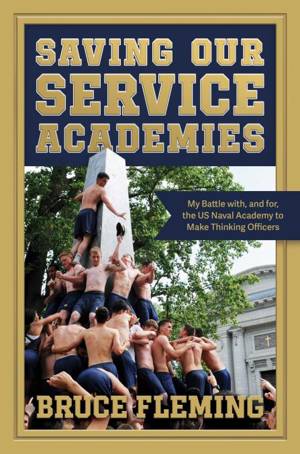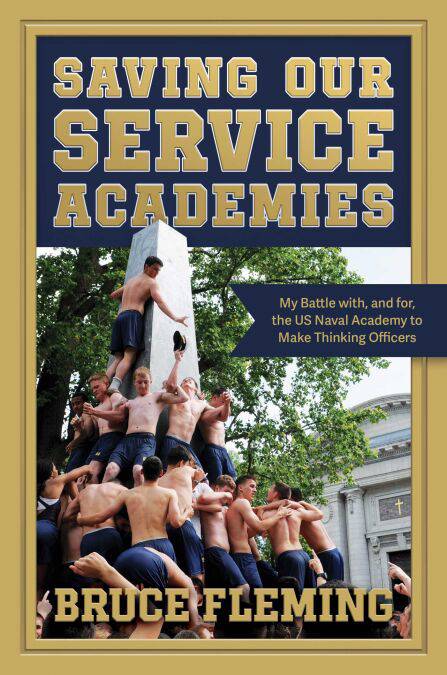
- Retrait gratuit dans votre magasin Club
- 7.000.000 titres dans notre catalogue
- Payer en toute sécurité
- Toujours un magasin près de chez vous
- Retrait gratuit dans votre magasin Club
- 7.000.0000 titres dans notre catalogue
- Payer en toute sécurité
- Toujours un magasin près de chez vous
Saving Our Service Academies EBOOK
My Battle with, and for, the US Naval Academy to Make Thinking Officers
Bruce Fleming
Ebook | Anglais
16,76 €
+ 16 points
Description
Once proud citadels of virtue, the US military academies have lost their way and are running on fumes. They need to be fixed before it’s too late.
Saving Our Service Academies covers one man’s unrelenting thirty-year fight with the military bureaucracy to instill qualities of force and thoughtfulness in officers-to-be, to show young men how to be adults with other men and women, and to show young women how to deal with the men.
Bruce Fleming has spent over thirty years teaching midshipmen and future officers at the US Naval Academy in Annapolis. This position was both a dream job and a nightmare for the enthusiastic, athletic, young Fleming. He found, in the thousands of midshipmen he taught, mentored, and exercised with for three decades, a heartbreaking waste of potential, as promising officers-to-be lapsed into apathy and cynicism because of the dispiriting reality behind the gleaming facade of the Naval Academy. What happened to duty, honor, and country at Annapolis? These values have disappeared in the wake of changes in the world, such as the rise of ROTC and the increase in expense of civilian colleges (the service academies are free to the students), and in the attempt to use the service academies as experiments in trendy social engineering.
A staunch advocate for military strength, Fleming shows how the smoke and mirrors of service academies produce officers who are taught to say “SIR, YES SIR” rather than to have the guts to say things their commanding officer doesn’t want to hear. Is that why the US hasn’t won a war since World War II? By writing op-eds about the waste, fraud, and abuse of government (and taxpayer) money, Fleming put a target on his back that the USNA administration used to fire him in 2018, despite being a tenured civilian professor. He was reinstated by a federal judge in 2019.
The service academies are government programs that no longer fill the needs for which they were created, and so like all government programs, can be re-examined. Indeed, as Fleming argues, they teach blind obedience in officers rather than informed and respectful questioning, and so sap our military strength rather than increasing it. They need to be re-imagined not as stand-alone undergraduate institutions that wall off future officers in an increasingly untenable isolation from the country they are to defend, but either be combined with the officer commissioning sources that currently produce over 80 percent of our new officers, or re-purposed to post-civilian college training institutions.
Saving Our Service Academies covers one man’s unrelenting thirty-year fight with the military bureaucracy to instill qualities of force and thoughtfulness in officers-to-be, to show young men how to be adults with other men and women, and to show young women how to deal with the men.
Bruce Fleming has spent over thirty years teaching midshipmen and future officers at the US Naval Academy in Annapolis. This position was both a dream job and a nightmare for the enthusiastic, athletic, young Fleming. He found, in the thousands of midshipmen he taught, mentored, and exercised with for three decades, a heartbreaking waste of potential, as promising officers-to-be lapsed into apathy and cynicism because of the dispiriting reality behind the gleaming facade of the Naval Academy. What happened to duty, honor, and country at Annapolis? These values have disappeared in the wake of changes in the world, such as the rise of ROTC and the increase in expense of civilian colleges (the service academies are free to the students), and in the attempt to use the service academies as experiments in trendy social engineering.
A staunch advocate for military strength, Fleming shows how the smoke and mirrors of service academies produce officers who are taught to say “SIR, YES SIR” rather than to have the guts to say things their commanding officer doesn’t want to hear. Is that why the US hasn’t won a war since World War II? By writing op-eds about the waste, fraud, and abuse of government (and taxpayer) money, Fleming put a target on his back that the USNA administration used to fire him in 2018, despite being a tenured civilian professor. He was reinstated by a federal judge in 2019.
The service academies are government programs that no longer fill the needs for which they were created, and so like all government programs, can be re-examined. Indeed, as Fleming argues, they teach blind obedience in officers rather than informed and respectful questioning, and so sap our military strength rather than increasing it. They need to be re-imagined not as stand-alone undergraduate institutions that wall off future officers in an increasingly untenable isolation from the country they are to defend, but either be combined with the officer commissioning sources that currently produce over 80 percent of our new officers, or re-purposed to post-civilian college training institutions.
Spécifications
Parties prenantes
- Auteur(s) :
- Editeur:
Contenu
- Nombre de pages :
- 288
- Langue:
- Anglais
Caractéristiques
- EAN:
- 9798888450475
- Date de parution :
- 08-01-24
- Format:
- Ebook
- Protection digitale:
- Adobe DRM
- Format numérique:
- ePub

Les avis
Nous publions uniquement les avis qui respectent les conditions requises. Consultez nos conditions pour les avis.






